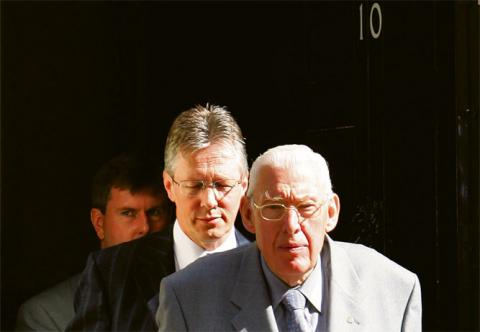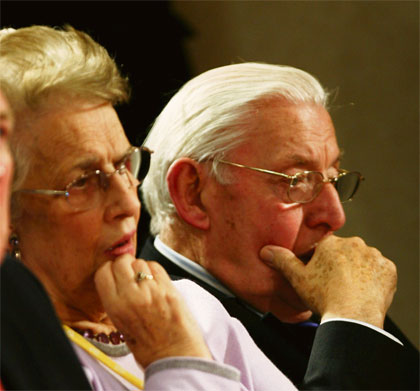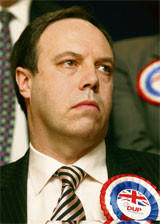The Boss, the Mammy and The A Team

As internal dissent plagues the DUP, candidates have been asked to sign contracts of loyalty, with fines for breaching party policy ahead of the Northern Assembly elections on 7 March. Fionola Meredith reports.
Pictured left to right: Jeffrey Donaldson, Peter Robinson and Ian Paisley leaving No 10 Downing St after talks with Tony Blair (Getty Images).
Ian Paisley jnr contacted “the-man-with-the-van” in preparation for the Northern Assembly elections on 7 March. The-man-with-the-van-and-the-sound-system, who had looked after the DUP in countless previous elections. Reliable. But this time the word is the-man-with-the-van said “no”. Disenchanted. Dismayed by the inexorable progress of the DUP to powersharing with Sinn Féin/IRA. He told Baby Doc to get lost. His defiance is mirrored within the party, now riven with dissent. Around one-third of the party's MLAs unhappy, the word is. Even a larger proportion disaffected among the orange grassroots.
The divide within the leadership has Ian Paisley, Peter Robinson and Jeffrey Donaldson on one side with Jim Allister and Nigel Dodds on the other. And the divide is fuelled by personal rancour between the deputy leader Peter Robinson and the party's successor to Ian Paisley in the European parliament, Jim Allister. Robinson was less than pleased at Allister's return to politics in 2004, largely because of Allister's capacity to rouse the hard-line masses within the party, to the discomfort of the main strategist, Robinson.
 There's been speculation for a long time that Peter Robinson was heading a more pragmatic “liberal” wing in the party, eager to get into office, against more traditional figures like the gospel-singing MP Willie McCrea. But the current situation is fuelled by ancient tensions: Allister and Robinson in particular are said to dislike and distrust one another. The MEP's tendency to make speeches which constrict the DUP's room for manoeuvre has been causing headaches for main party strategist Robinson.
There's been speculation for a long time that Peter Robinson was heading a more pragmatic “liberal” wing in the party, eager to get into office, against more traditional figures like the gospel-singing MP Willie McCrea. But the current situation is fuelled by ancient tensions: Allister and Robinson in particular are said to dislike and distrust one another. The MEP's tendency to make speeches which constrict the DUP's room for manoeuvre has been causing headaches for main party strategist Robinson.
Pictured: Jim Allister
Lurking in the background exuding narrow-eyed scepticism are the members of the party's ‘Dirty Dozen' (otherwise known as the Twelve Apostles, or even the heroically rigid “men who would not bend”) such as McCrea, Gregory Campbell and Maurice Morrow. It wasn't just Michael Stone's impromptu piece of “performance art” that created confusion at Stormont last November. Significant fissures were exposed in the party when the 12 issued a statement refusing to accept that Paisley was agreeing to be nominated as First Minister after a spring election. Add in pressure from the hardline Orange Order group, The Spirit of Drumcree, as well as from various victims' groups, and it's evident there's a chunky rump of trouble for Paisley, wanting no part in where the DUP is going.
Many other dissenters haven't broken cover yet, but resentment against the DUP's latest blunderbuss attempt to slap down the troublemakers may make them more likely to emerge: if they're feeling brave – or rich – enough. Assembly election candidates have received a two-page contract asking them to sign a resignation letter, which could be triggered if they breach party policy. Non-compliance could mean a £2,000 fine (reduced from an initially mooted £20,000). It's an obvious (but possibly legally unenforceable) attempt to ensure obedience to the leadership, which has caused muffled accusations of totalitarian strong-arm tactics within the ranks.
There's speculation that there are 17 candidates refusing to sign on the dotted line, fearing that they could be zapped by high command immediately after the election. Even less hot-headed party members are disappointed by the control-freakery and lack of trust shown by the leadership. It now seems that Ian Paisley himself is firmly set on having his last hurrah as first minister of Northern Ireland, transcending his career to date and reputation as a destructive outsider.

Strangely, credit/blame for the transformation of Paisley is attributed to Baroness Paisley of St George's, his wife, Eileen. Orange historian and former DUP politician Clifford Smyth says a definite change took place in Paisley's attitude in the summer of 2006: he suggests that the baroness may well have put it to her husband that it was now “the right time to go down in history as the solver of the Irish problem”. Columnist John Coulter agrees that the influence of “Mammy”, as Paisley calls her, shouldn't be underestimated. Writing in online journal The Blanket, he says, “Eileen – to whom the Big Man is totally devoted – would not want her husband's legacy to be [that] he sold ‘Loyal Ulster' down the treacherous path of joint authority with Dublin” (one perceived alternative if devolution were now to fail again).
Pictured: Ian Paisley with wife Eileen. Getty Images
If true, Eileen Paisley has changed since she served on Belfast City Council. Protesting against the council's decision to allow each locality in the vicinity of children's playgrounds to have the choice whether play areas should open on Sundays, Councillor Eileen Paisley claimed the move was a surrender to “communists, republicans and black popery”.
Many disgruntled unionists opposed to the St Andrews Agreement have been venting their wrath on blogs like Voice 4 Democracy where readers have been enjoying a series of posts called “Jackanory”. It's a spoof of life in the DUP, which characterises Paisley as The Boss, a befuddled old patriarch with an idiot son (Junior Boss), sidelined and manipulated by The A Team: “a small group of nepotists” led by Peter Pragmatist and Jeff Done-Me-Sums. In one episode, Junior Boss stammers: “I don't understand, Dad. I used to be allowed to play with Loyalists. Can I not even play bands now?” “Certainly not!” bellows the Boss. “That's all over and done with now! You can play a new game called “Residents Groups” and like it! You can download the rules from the Chucky Armani website though you basically just have to hate Protestantism and its associated culture. Even you could understand the basics of it!”
The biggest problem for the DUP is that they have shouted so long and hard about the Ulster Unionists “supping with the devil” (going into government with Sinn Féin) that their grassroots are insufficiently prepared for powersharing. Irish News columnist Brian Feeney thinks that Paisley's about-face has been so sudden that many of the party faithful are still in shock. “There has been no education process in his party. The ground has not been prepared as Sinn Féin's leaders prepared republicans slowly and carefully over years, losing some by the wayside. As a result, Paisley's lieutenants are still using the rhetoric of hatred and fear of republicans they have become used to spouting over the years, as though nothing has changed.”
 And there could be a heavy price to be paid for that crucial lack of preparation: “The DUP imagined that it had anti-Agreement unionism all stitched up – but candidates will emerge to challenge them,” says Clifford Smyth. The test will be in the number of voters who break with the party where they have an option of voting for an anti-St Andrews candidate. Already, there are seven DUP councillors in Paisley's Ballymena heartland refusing to campaign for him. Then came two high-profile resignations: George McConnell, one of the DUP's founding members and a party branch chairman for more than twenty years, and veteran councillor Jack McKee. Both men say they won't be backing the DUP at the polls. Limavady councillor Leslie Cubitt's announcement that he is quitting the DUP to join Robert McCartney's anti-St Andrews UK Unionist party is another blow to the party. Has complacency blinded Paisley to the inherently schismatic nature of the unionist electorate?
And there could be a heavy price to be paid for that crucial lack of preparation: “The DUP imagined that it had anti-Agreement unionism all stitched up – but candidates will emerge to challenge them,” says Clifford Smyth. The test will be in the number of voters who break with the party where they have an option of voting for an anti-St Andrews candidate. Already, there are seven DUP councillors in Paisley's Ballymena heartland refusing to campaign for him. Then came two high-profile resignations: George McConnell, one of the DUP's founding members and a party branch chairman for more than twenty years, and veteran councillor Jack McKee. Both men say they won't be backing the DUP at the polls. Limavady councillor Leslie Cubitt's announcement that he is quitting the DUP to join Robert McCartney's anti-St Andrews UK Unionist party is another blow to the party. Has complacency blinded Paisley to the inherently schismatic nature of the unionist electorate?
Pictured: Nigel Dodds
But while cracks are appearing in the formerly monolithic structure of the DUP, Paisley's imprimatur may still be enough to swing the mass of DUP voters behind powersharing. Party sources are adamant that the DUP has learned lessons from the implosion of the Ulster Unionist Party: according to one member, “We're like family when all is said and done.” It's true that outside the constitutional issue, party members can still find plenty of cosy common ground: for instance, they were certainly all singing from the same hymn sheet when it came to driving opposition to the new sexual-orientation regulations in the North, designed to protect lesbian and gay people from discrimination when accessing goods and services. When it comes to saving Ulster from sodomy, the DUP are still one big happy bunch.
The touchiest issue for the DUP at the moment is the transfer of policing and justice powers to a devolved assembly. While Sinn Féin's positive move on policing does give Paisley something to sell to the faithful, the DUP is sticking to its mantra that it won't be forced by deadlines, insisting that the party will be “condition-led, not calendar-led”. Peter Robinson has demanded that Sinn Féin must “build confidence” before policing and justice powers could be handed over from Whitehall. But the deputy leader also appeared to agree that the government's aim of devolving policing powers by May 2008 could be achievable, describing the date as “the very earliest part of the tolerance of most people”. Peter Pragmatist indeed.
In January 1965, Ian Paisley lobbed snowballs at Sean Lemass's car at Stormont, as he arrived for a meeting with Terence O'Neill. Next month he could enter government as Northern Ireland's First Minister with Martin McGuinness as his deputy. It sounds like Mammy and The A Team will be right behind him. But they'll need to find a new van driver.
